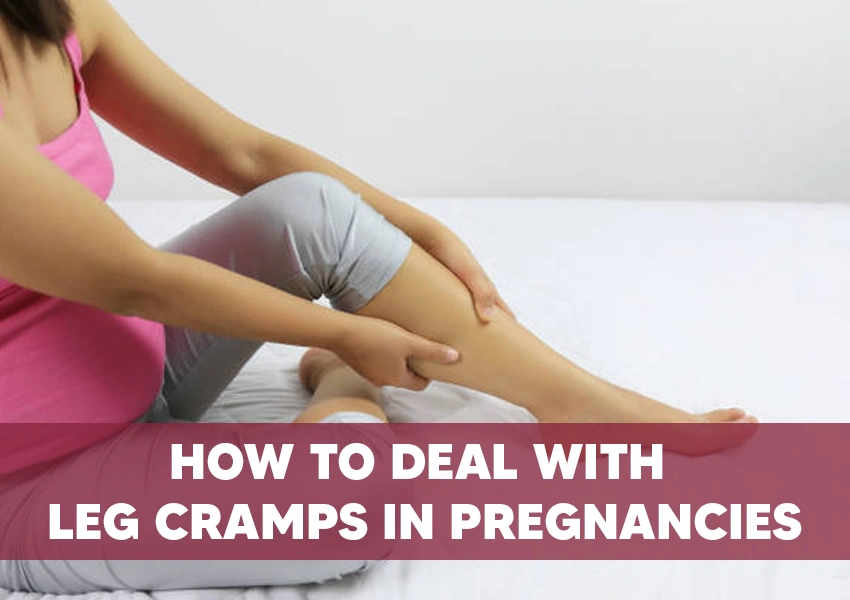How To Deal With Leg Cramps In Pregnancies: Step By Step Guide
While pregnancies bring a lot of joy
and transformations, they also bring along a few physical difficulties
with them, one of them, is leg cramps. That sudden and painful contraction
of muscle tissue can cost you sleep and disrupt your daily routine, making you
look for solutions. This article provides an overview of why you may experience
leg cramps during pregnancy, what they feel like, and some effective treatments
for leg cramps, broken down into each trimester.
What Are Leg Cramps During Pregnancy?
Leg cramps are involuntary muscle
contractions, typically in the calves. These spasms are a common occurrence in
pregnancy and seem to happen with greater frequency at night. It’s leaving many
pregnant women unable to sleep each night. While they’re typically harmless,
they can be painful and affect your comfort.
Leg Cramp Causes in Pregnancy
Increased
Weight:
Your body undergoes many changes
during pregnancy, which include weight gain as your baby grows. That extra
weight creates extra stress on your leg muscles and joints - more, as pregnancy
progresses.
Muscle Effects:
Increased load can
also stress the muscles, which can make leg cramping more common.
Palliative Relief:
Supportive, cushy
shoes and giving your legs a break periodically can relieve pressure and reduce
cramps.
Circulation
Changes:
To accommodate your growing baby,
your body increases its blood volume and then alters its circulation patterns.
These changes can cause a reduction in blood flow to your extremities -
especially your legs - and lead to cramps:
Stagnant Venous Return:
The
increasing weight of your growing uterus can compress your veins against your
pelvis, which slows down the return of blood from your legs to your heart.
The late stages of Pregnancy:
This
is more common in the later stages of pregnancy when the babies are larger so
they press the blood vessels.
Prevention tactics:
When you sit or
lie down, raise your legs to help blood circulation and do not keep your legs
crossed for a long time.
Nutritional
Deficiency
Pregnancy increases your body’s need
for certain nutrition, and a lack of minerals such as magnesium, calcium, or
potassium causes muscle cramps:
Magnesium deficiency: This mineral
plays a role in regulating muscle function, and low levels can lead to muscle spasms
and cramps.
Calcium deficiency: Calcium
is important for muscle contraction and relaxation. Then imbalance and
eventually cramp due to poor intake.
Potassium Deficiency: Aids
your muscles and nerves to maintain function with sodium. Low levels, though,
can disrupt that balance, leading to cramps.
Remedy: Make sure you are eating a
diet high in this nutrient, including leafy greens, dairy products, bananas,
nuts, and seeds.
Dehydration
Hydration during pregnancy is
especially important, as it helps to balance your electrolytes and keeps your
muscles working properly. And not getting enough water can dehydrate you, which
can cause those pesky leg cramps:
Electrolyte Overload: When you’re dehydrated, stuff like sodium, potassium, and magnesium stops working properly, which can lead to muscle spasms.
Hot Weather Woes: Your thirstiest
and crampiest days tend to be hot - pregnant women are generally more
sensitive to heat - or even light exercise.
Drink enough water: make sure you
get 8-10 glasses of water in a day. If cramps are common, you could add
electrolyte drinks as well.
Symptoms of Pain During Pregnancy
- Severe pain in the calves or feet.
- Hardening or tightness of the affected muscles.
- Soreness that remains after the cramp has resolved.
- Common at night or post-exertion.
Leg Pain in Early Pregnancy:
Leg pain is sometimes less common in
the first trimester due to fatigue and hormonal changes. Faint twinges of
cramping might also signal changes your body is making to host the pregnancy.
First Trimester Leg Pain
in Pregnancy:
As your pregnancy belly expands,
your legs may take more of a pounding in the second trimester. You can start to
see nutritional deficiency and circulation issues, with more and more cramps.
Third Trimester Leg Pain
in Pregnancy:
In those last months, your baby’s
added weight and the change in your center of gravity put lots of stress on
your legs. Coupled with less mobility and potential swelling, leg cramps can
become a nightly event.
How to Deal with Leg Cramps in Pregnancy
As such, here are actionable tips
to ease and prevent leg pain while pregnant:
Stay Hydrated:
- Drink at least enough water every day so that you stay hydrated.
- Add coconut water or other electrolyte-rich fluids to replace lost minerals.
Stretch Regular:
- Before bed, stretch your calves and legs to loosen tight muscles.
- Gradually and gently flexing and pointing your toes might help.
Exercise Moderate:
- Do low-impact exercises such as walking, swimming, or prenatal yoga to boost circulation.
- Minimize excessive sitting or standing.
Elevate Your Legs:
- Elevate your legs when you sit or lie down to relieve some of the swelling and encourage better circulation.
- Sleep with a pillow under your feet.
Wear Comfortable Shoes:
- Choose footwear that supports and protects your feet, alleviating stress from your leg joints.
- No high heels or shoes that are tight-fitting.
Natural treatments for Muscle Cramps During Pregnancy
- Chamomile Tea: Chamomile tea, also famous for its muscle-relaxing properties, can help alleviate cramps.
- Essential Oils: Lavender or eucalyptus oil diluted and massaged on the legs can help.
- Apple Cider Vinegar: Mixing a tablespoon of apple cider vinegar with water helps restore electrolytes.
- Magnesium-rich foods: Almonds, avocados, and dark chocolate can naturally boost magnesium levels.
Understanding the Science Behind Cramp's
Cramps are the involuntary
contractions of a muscle caused by the hyperactivity of adjacent nerves.
Mineral levels change and the circulatory system is treated to a whole new
marathon during pregnancy; these triggers are magnified. Hormonal surges may
also affect nerve sensitivity, which may cause cramping, studies suggest.
How to Avoid Leg Cramps in the Long Run
Regular Exercise: Keep legs strong
by incorporating physical activity into you're daily routine.
Hydration Schedule: If you’re not
used to drinking regularly, create a schedule for yourself.
Follow proper posture to save your
legs from extra strain.
When to Seek Medical Advice:
Although leg cramps in pregnancy are
usually harmless, ask your healthcare provider if:
- The pain is constant and unbearable.
- You notice swelling, redness , or warmth in the affected leg, which may signal a blood clot.
- The cramps disrupt plenty with you're everyday activities or sleep.
Conclusion:
Managing leg cramps during pregnancy
can be uncomfortable, but they are totally navigable with the right protocols
in place. However, by remaining active, hydrated, and aware of your nutritional
landscape, you can minimize the frequencies and severities of cramps. Add in
stretching at least a couple of times per week, using proper ergonomics (try a
standup desk,) and a champion diet (more protein, healthy fats, and veggies for
improved circulation and muscle recovery). Always heed your body, and if you
have doubts, talk to your healthcare provider. It is definitely a temporary
stage in your life, so remember that caring for yourself at this time will be
an assurance that you will go through pregnancy journeys well and easily.
Frequently Asked Questions
1: Is leg cramping a normal sign of pregnancy?
A: Yes, leg cramps are quite
common during pregnancies, thanks to weight gain, hormonal changes and
circulatory adjustments.
2: How can I avoid nighttime leg cramps?
A: Doing stretches before bed,
staying hydrated, and propping up my leg at night to decrease my chances of
cramping.
3: Is leg pain in early pregnancies normal?
A: Leg pain, while rarer in early
pregnancy, can still happen because of hormonal changes and fatigue.
4: Are there pain relief medications I can take for leg cramps during pregnancy?
A: Please check with your doctor
before taking any medicine. Most leg cramps can be treated with natural
remedies and lifestyle changes.
5: Why do leg cramps happen more at night?
A: A combination of reduced
circulations and prolonged muscle inaction during sleep can trigger leg cramps
at night.


